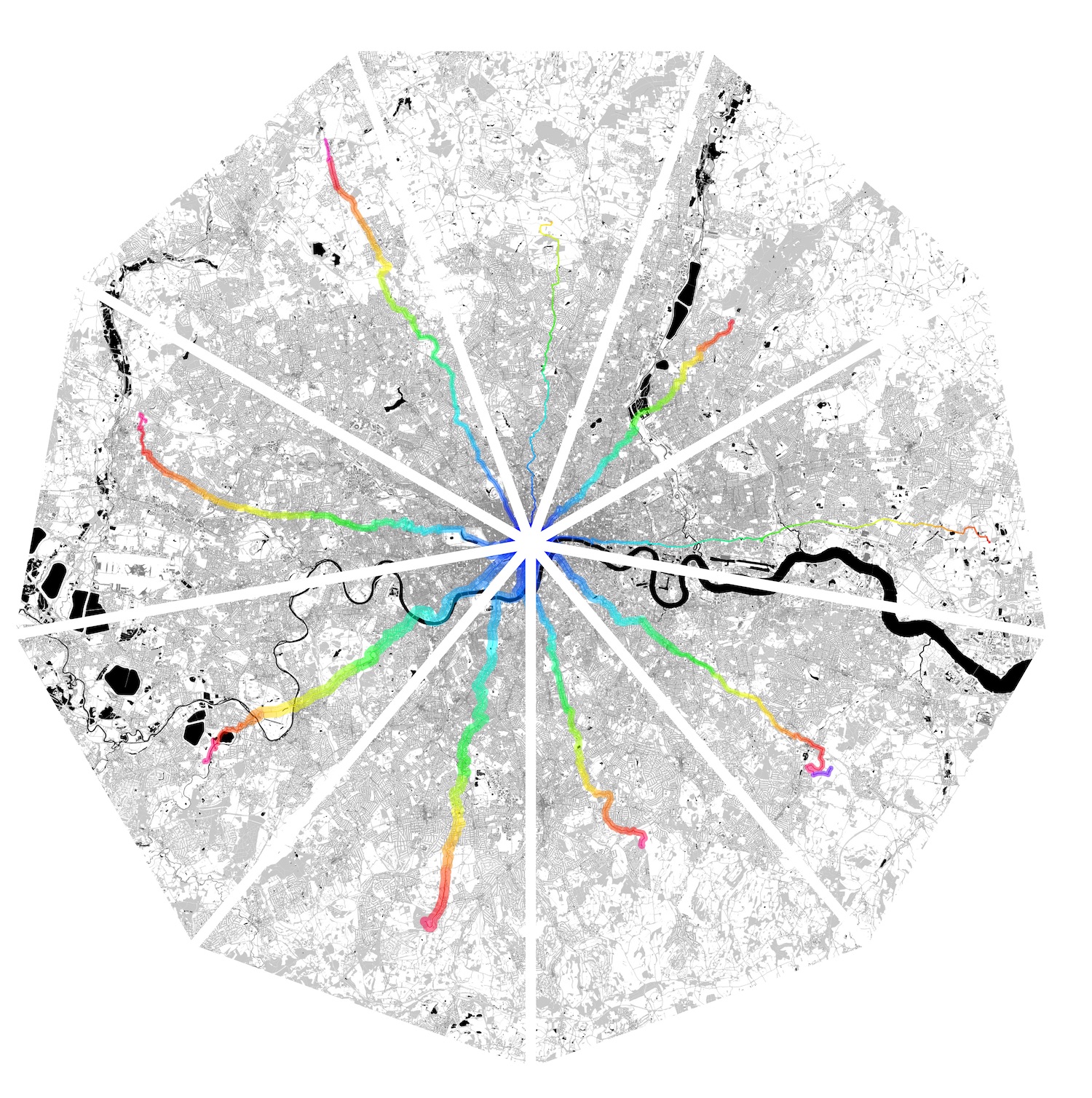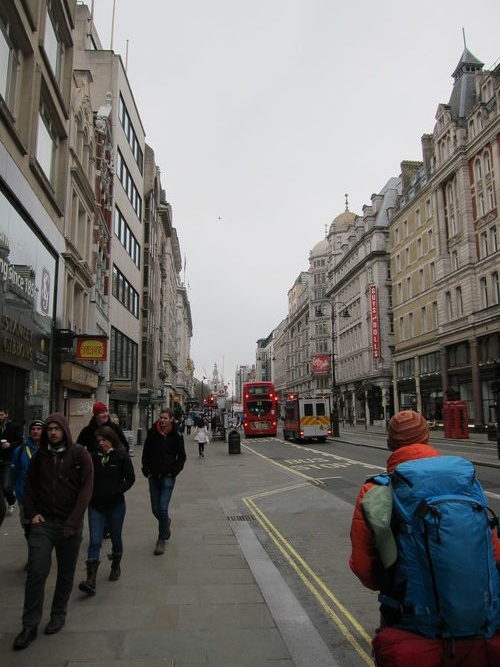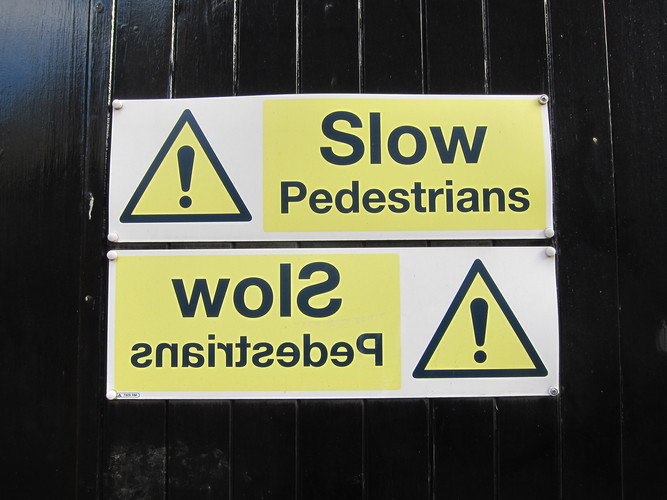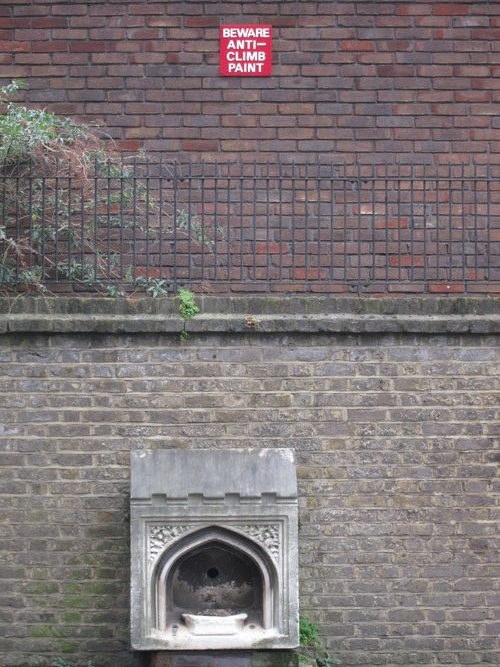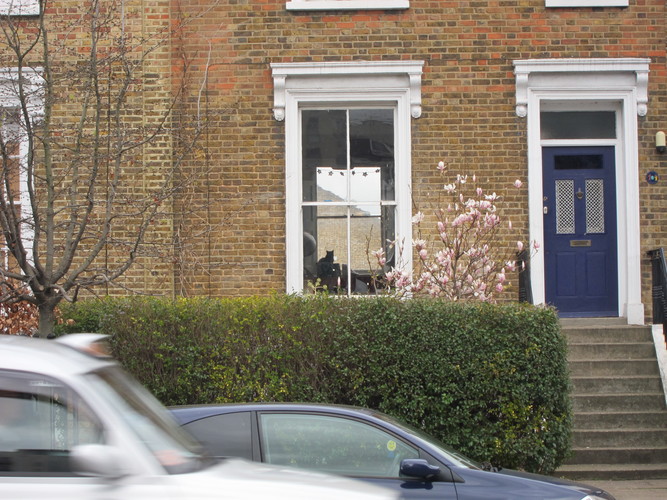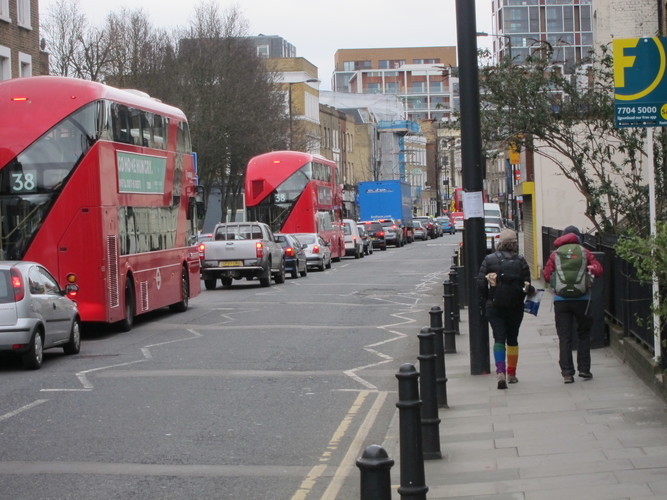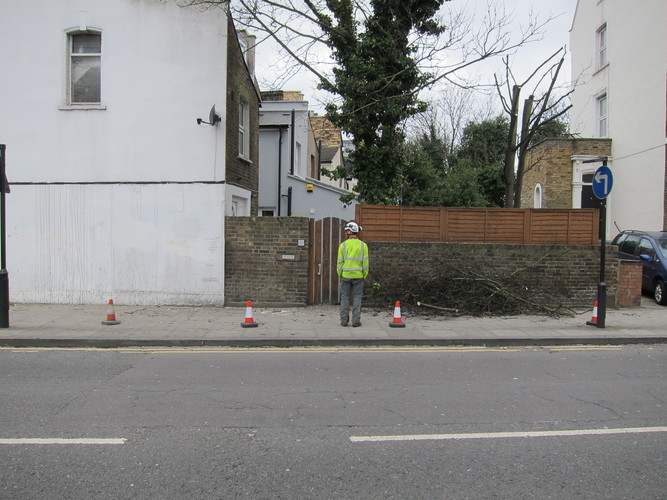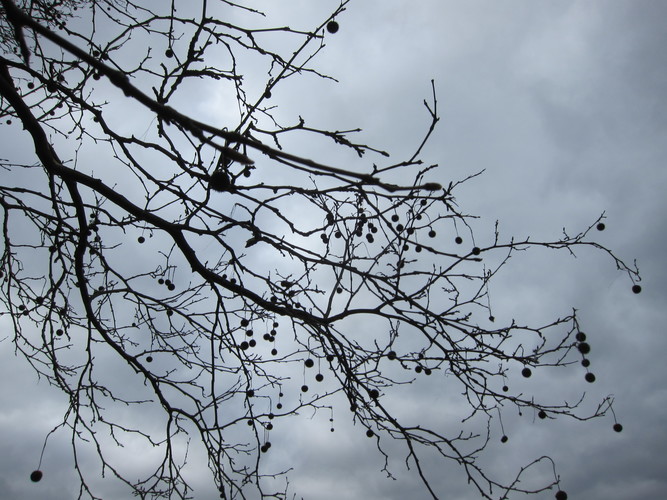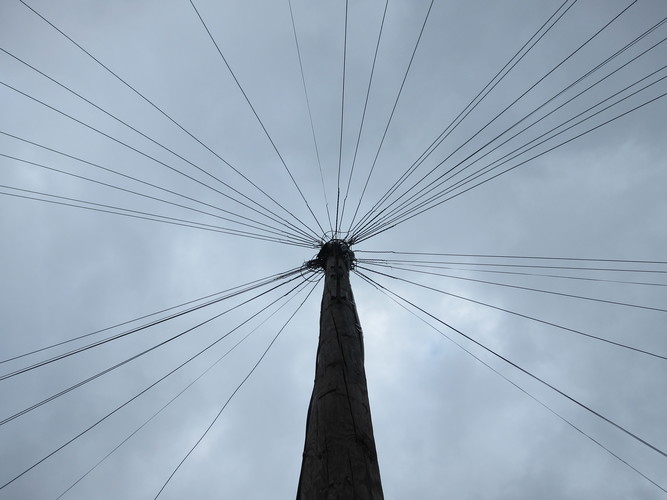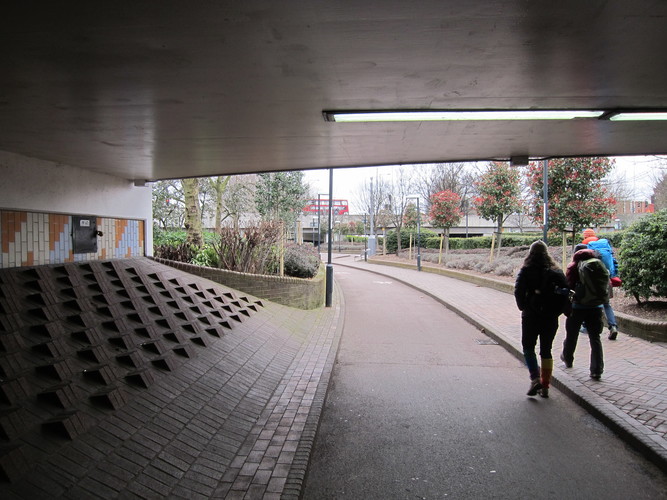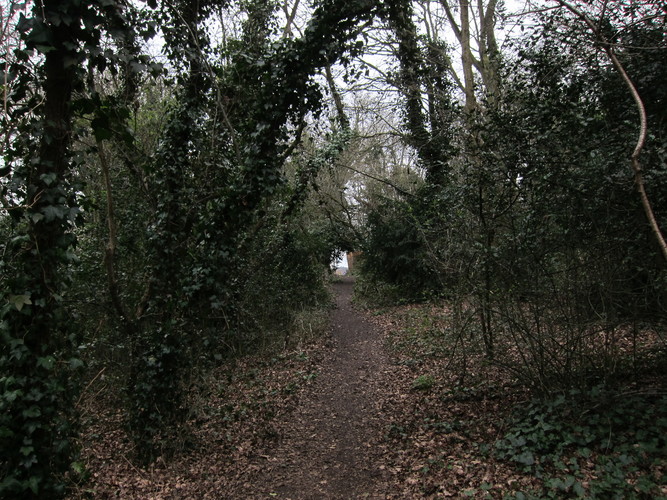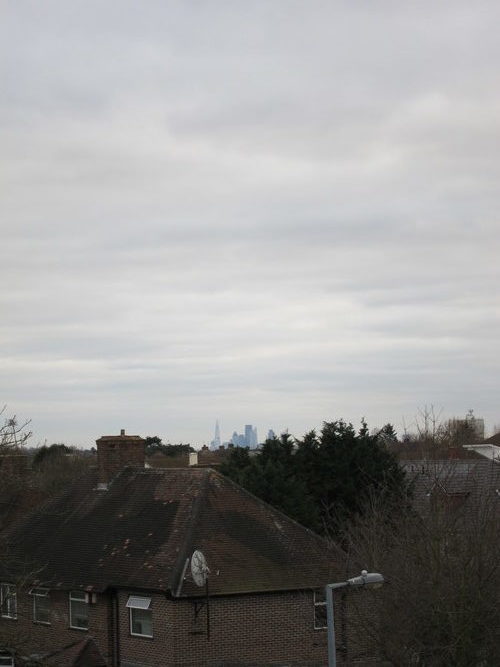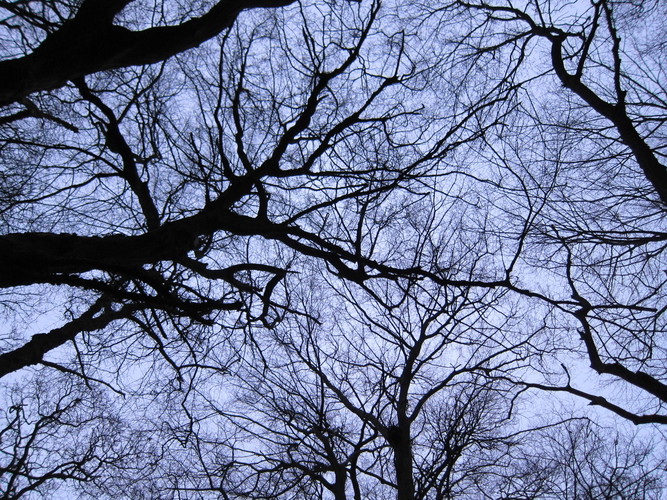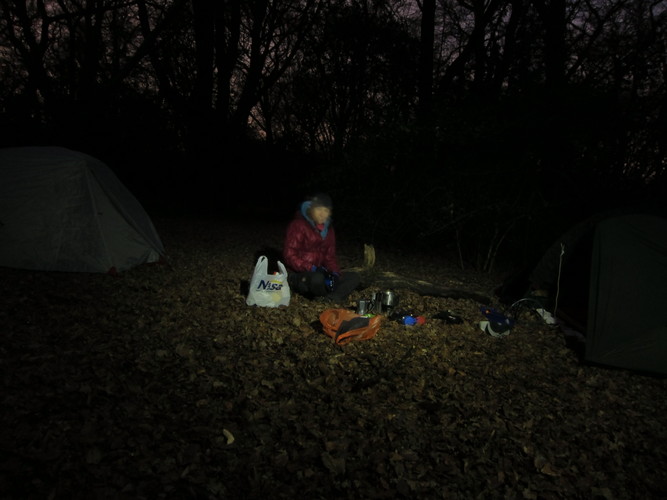I was exhausted before we left the house. A week of minor yet chronic sleep deprivation and some sort of allergy had left me dull and feeble. The dates have been set though, and Lisa was visiting from LA, so the adventure was non-negotiable. Around 8am we were ready. As we walked, Lisa noted that she should have brought her gloves. We stopped at the new ‘organic’ cafe on the corner by the tube station. In two batches I bought two croissants, a pain au chocolate, and two coffees. The second batch was for the tube. We commandeered part of a row of seats, spreading out backpacks, croissants, and coffee cups, as I double-checked my GPS setup.
We arrived late, and spotted Matt and Marita, waiting at Charing Cross, as we approached the National Portrait Gallery. The Gift Horse on the 4th plinth looked good under dark grey clouds . After introductions, we set off, a few minutes late. Forty degrees led straight down The Strand. It drizzled; backpacks on, we merged with the tourists. One of Lisa’s toes had been bleeding throughout the week. I hoped it wouldn’t get worse.
We left The Strand to stay on track, past a gaggle of outdoors shops, then beneath scaffolding near Covent Garden, with occasional views of the telecom tower between breaks in the buildings to the north. We continued through side-streets, then crossed a busy arterial road, skipping around barriers along the divider. On the other side we followed a short sidestreet into Lincolns Inn Fields. Cafes were closed. I took a photo of two people boxing, and got shouted at by a third person, yelling that I should ask before taking photos of people. I was taking a photo of the entire vignette, but I understood. On the far side of the park we found old toilets, apparently mainly for taxi drivers. I stopped to use them; I’d drank a lot of water and coffee.
We continued down an alleyway, crossed another major road, then more alleys into Grays Inn Gardens. Above, suddenly, blue skies. “Keep off the grass” signs abounded. Despite no gods and no masters, people don’t hesitate to put up authoritarian signs. We followed tunnels through red brick buildings, passing from courtyard-to-courtyard, but ultimately ended at a dead end. What to do? We decided against clambering over the 10-foot wall, and turned back. A sign at a locked gate said ‘Out’, so we continued back-tracking. Ultimately, I asked a nice, preened lawyer-type how to get out. He said back the way we came was the only way. The whole setup seemed like a fire hazard, but c’est la vie; we returned to emerge onto an unrestricted major road.
We found ourselves on the external face of the wall that had blocked our way minutes earlier. We’d been walking for an hour. We followed the major road for a hundred metres, then left it to return to sidestreets. One street, lined with boutique-ey stores; a closed coffeeshop with a cute bunny T-shirt in the shop window; another, a mannequin of David Beckham. Soon we passed St James’s churchyard in Clerkenwell, old, hemmed in, with a high fence with anti-climb paint. Despite blue skies ten minutes earlier, it had become imposingly dark.
We continued meandering, now through blocks of flats. Crossing Goswell Road, we found a small urban park with a nice playground, but no toilets. Lisa and I swung on the swings, which were super-powered, rapidly accelerating, feeling a little dangerous. A mother walked her small daughter through the park. After a few minutes we walked on. We were just south of Angel. As we neared the canal, huge, shiny new apartment buildings rose into the sky. Very swish. At a McDonalds on the main road we took it in turns to walk in to use the toilet, while the others traded snacks, hanging out on the low brick wall outside. I scored a home-made crunchy ginger cookie from Marita in exchange for one of my home-made energy bars: yum.
It was cold. We walked on, past the Wenlock Arms, still closed. I had met Lisa there for a mid-afternoon drink last time she had visited London, 18 months ago. I thought Rachael had joined. Around the corner, and past the ever-endearing “Feather Merchants” building, we found a row of nice old London houses, then crossed the canal. A wet-carpet dog passed by. Lisa thought her friend Alex lived in one of the apartments overlooking us. Next, we took the towpath east, busy with bikers, runners. Leaving the canal at the next opportunity, we sensed a shift from central London, and tracked up a long, straight road, zig-zagging east whenever we had the opportunity. Wide roads, big old houses, though it was barren in mid-March, particularly with no trees.
We emerged onto traffic-jammed Balls Pond road, and walked along it for a moment, before striking north into the area just south of Newington Green. A housing estate; feathers on the ground. I thought we were near where Carole lived. Lisa talked of cats. And surprisingly, it was getting even colder. We made a bit of a detour around a block of flats to find the way across a railway line. Lisa broke out her large packet of crisps that she had been carrying, and I ate more than my fair share. Roadworks and hot tarmac, traffic congestion and confusion, then soon we crossed Kingsland High Street. The weather was grim, and I was reminded of how tired I was; really exhausted. My tiredness was partly physical, but mainly sleep-deprivation, and I felt completely worn-down. I just needed to sleep, but the day was just getting going. I wondered when, and where, I would sleep that evening.
After an initially jovial adventure, the group’s morale dropped. The area was far from inspiring. We pushed on, just north of Dalston, an area with a healthy population of cats. Long roads without trees, the sky full of clouds, trees lacking leaves, people on the streets, hip fathers with beards, young families with pushchairs, inner suburbia, coffeeshops, mundanity. Over the next half hour we plodded down a long road, transitioning into suburbia, with mutterings from everyone about needing the toilet again. After another fifteen minutes the sun came out. Lisa would have felt weird going on this walk without carrying anything, so she was carrying a sleeping bag: a sympathy load, a solidarity load. Her shoulders were killing her.
At midday we stopped outside a petrol station, in an orthodox Jewish area. We stepped in to use the toilet. I was hungry, and group morale remained low. London is never at its best in the grey. We agreed to stop at the next pleasant space—a park, if possible—for lunch, and with that in mind, we walked on.
Later, orthodox Jews and women in hijabs walked momentarily in phase. Down a side-street, we found more housing estates, mundane, but with unusually expansive views at the end of the road as the land dropped away. We found that we were approaching the river Lea. Dropping down, zig-zagging through short streets, and into a small park, we tried to find a sheltered place for lunch amidst the cold. I noticed benches on the other side of the river, and a pedestrian bridge nearby, so we traipsed over the bridge to the tables, and stopped. It remained uncomfortably cold, but we ate our lunches, cold balti I had cooked during the week, with vacuum-packed naan breads that Lisa had picked up from a shop earlier. Perhaps unsurprisingly, the naans were stale. The four chocolate muffins l had bought the previous night looked good, and remained in good shape despite having been rammed into the top of my backpack. The skies remained grey, and we hunched over the table with all of our clothes on—jackets, hoodies, hats. Still no-one was excited about the day, but it was a milestone to have crossed the Lea and to be surrounded by grass and bushes. Walthamstow was next, but we didn’t know what came after that.
We packed up from lunch and headed onward, outward, over the grassland. It was just after 1pm, and remained uncompromisingly cold.
The strip of land along the Lea was full of reservoirs, and as we left our lunch site we found ourselves walking along an asphalt road with a reservoir on our left. On our right, a sewage treatment works. The cold was incessant, and Lisa didn’t seem to be enjoying this way of experiencing London. I wondered if she wanted to leave. Nevertheless, I began to feel chirpier, and it seemed everyone’s mood was slowly improving. In the reservoir to our left was a fake island, inhabited by many birds. We emerged into grey suburbia, terraced houses, and walked on into Walthamstow.
After a while we stopped in the William Morris gardens, at the end furthest from the house, next to an adventure playground and an upmarket cafe. A gang of kids postured, walking in formation, but otherwise the space felt safe, with cool young families catching up with each other. I yearned to buy a coffee, and felt drained, exhausted.
After a short stop, we walked across the park, and out, down a paved path between an avenue of trees, and back into suburbia. Here, the relatively modern suburbs suggested the outer edges of London, with patches of green, and grass, and space. As we crossed a major road, it felt that we could burst into fields at any moment, though I knew we couldn’t be there yet. Council estates and terraces gave way to yellow-brick semi-detached new houses in cul-de-sacs. Progress became harder in this suburban landscape, designed for cars, and cul-de-sacs and loops of roads like the fringes of Mandelbrot sets. At the end of a cul-de-sac we thought we were at a dead end, but then found ourselves in a concrete playground with kids. It wasn’t clear if we could get through, with the hint of an alley out on the far side of the concrete, unsigned and unobvious. We walked over to investigate, and found that the alley was real. The kids yelled at us, wishing us “happy camping”. “If that’s what you’re doing”, they added, and, considerately, “sorry if you’re not”.
As we emerged from the playground we saw a wooded hill on the near horizon. We had emerged into Chingford tennis courts. I chose the wrong way around the courts to a dead end, full of brambles and bushes. We turned back, down the type of road that never sees pedestrians, flanked by out-of-town plumbing superstores. Views of the wooded hills remained, tantalizing. I dreamed of setting up my tent in them, cooking, nestling into my sleeping bag, and sleeping.
As we escaped the industrial estate we turned onto a suburban main road that wound around the base of the nearest wooded hill. We were elated to see a muddy track leading up into the wood between the houses, and turned off onto it; a northwestern passage out of the suburbs. The track was was boggy, muddy, exciting, and everyone was invigorated to find this unanticipated passage into the wilds. The woods fanned out, and we struck off up a random hill that expanded to fill the terrain. At the top we stopped, dropping our packs. Matt wandered off, looking for possible campsites, behind a fallen-down concrete wall, and I joined him, scouting out the terrain. After serious exploration, however, we consensed that we weren’t properly out of London. The hill was an oasis, tame, surrounded by suburbs and warehouses. I decreed that we kept going, and we departed the wood.
A path led us out of the wood in much the same style as our entrance, and delivered us farther down the road that we had been following before our woody distraction. We passed a bus stop that led to Walthamstow, and Lisa opted to leave us there, to head back into town. She had a possible dinner arranged with colleagues that would be good to attend. I vowed to try my utmost to make it home to help her carry her luggage to the tube station before 8am the next morning so that she could make it to Heathrow with plenty of time. Matt, Marita and I waved her off and walked on.
Immediately, we passed under a railway line, zig-zagged through suburbs, and crossed a major road on a pedestrian bridge, from where we had views back to Canary Wharf and the Shard. Rain spotted down on us, but woods, more consolidated now, lay ahead. Soon we passed down an alley into a wood, albeit groomed. Nevertheless, it was substantially wilder than the copse we had considered an hour earlier, and promising. Soon we crossed another road, with signs of cows on the road, and welcoming us to Epping Forest. On the other side of the road, we found ourselves walking across an open grassy space surrounded by woods, and no people in sight. We needed to periodically leap strips of puddles, and now it was clear we were much farther out of London. Soon, we were into the wood proper, and after departing the path and splashing through leaves for a few minutes, we settled on a flat patch shielded from view by dense holly bushes.
We setup tents. Soon Matt was stirring broccoli and chopped veg in a pan over a stove. I added lentils and water. It was a good, hearty meal, and Matt and Marita shared a small bottle of champagne with it. I lay in the dry leaves and looked at the sky. Somehow it was warmer now, and it was great to rest. I poured hot water into one of my water bottles to put into my sleeping bag to keep warm, and by 7pm I was tucked up in my sleeping bag ready to sleep, collapsed to slumber until morning, with no will to read or write. Throughout the night I was awoken occasionally, seemingly if only to appreciate being able to go back to sleep, by epic owls, different cries, one real “twit-twoo”, and another, wheeling, spiralling, immediately above my tent. I was aware of this while only half-awake, and it was comforting to have this, and to be out of London.
We woke early, and by 6:15am we were heading back through the cold and wet of the early morning, damp and foggy. We took a different route out of the forest than we walked in on, intuiting the route, skirting the rear of a warehouse or service depot, and onto a main road through the forest, only to find that we had camped half a mile from a chain hotel on the side of the road. We followed the road to an Overground station which took us to Walthamstow, and home. I was back in time to meet Lisa as she was leaving my flat, and helped her walk her broken suitcase across the park. She had had a good time at dinner as we had slept beneath the owls.
